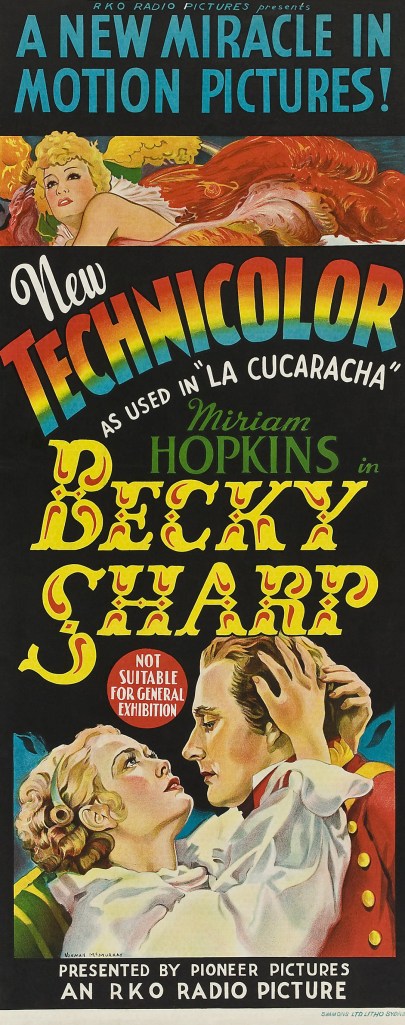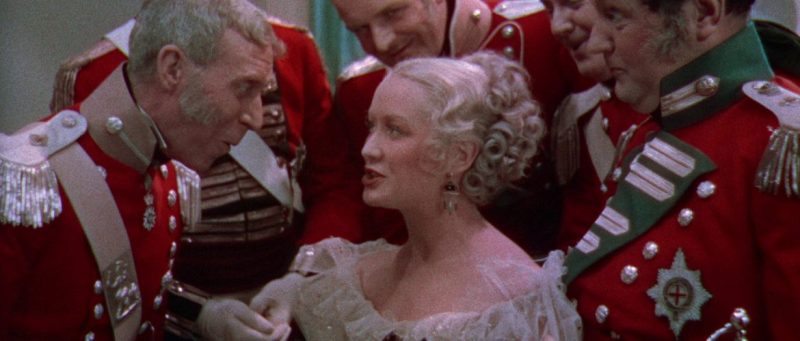Historical/period/epic

Film review by Jason Day of Becky Sharp, the 1935 movie adaptation of W.M. Thackeray’s novel Vanity Fair. Starring Miriam Hopkins and Frances Dee and directed by Rouben Mamoulian.
To like this post, comment on it or follow this blog, please scroll to the bottom. Use the search function on the left of the screen to look for other reviews and updates.
Synopsis
Despite her humble beginnings, poor but intelligent and machiavellian orphan Rebecca ‘Becky’ Sharp (Miriam Hopkins) leaves Miss Pinkerton’s finishing school for school for girls with nothing but a dictionary and a close, unsuspecting friend in Amelia Sedley (Frances Dee).
Hungering for acceptance into acceptable society, Becky weedles her way into various sub-spheres of it, finally marrying soldier Rawdon Crawley (Alan Mowbray), without the blessing of his rich family.
When they are cast out, Becky must use all her wits and wiles and Rawdon’s skill at the gambling table to make a high life for themselves, whatever the cost.
Review, by @Reelreviewer

If ever there were an archive film in need of a good movie preservationist’s clean up, this is it!
A scratchy and stagy farrago overall, but with some winning moments and performances, Becky Sharp has a place in cinema history as the first full-length movie in full (i.e. three-strip) technicolour.
Spirited, Southern lass (that’s in the America, not England – she was a native Georgian) Hopkins – in her only Oscar nominated performance, for Best Actress – sounds nothing like the Becky Sharp you expect, but makes an intriguing, oddball choice of actress to play her.
Hopkins is one of my favourite, classic Hollywood actresses, who earned a much coveted rosette from noted critic Leslie Halliwell, who categotised her forever as a “teary eyed comedienne of the early 1930’s”.
A very myopic summation of her achievements in non-comedic roles, in my humble opinion.
With her blonde good looks, sparkling wit (fine honed in all those Ernst Lubitsch comedies she starred in) and daring dress sense, she’s as good a Becky as any and is a delight to watch and listen to.
Very often, we Brits think Americans don’t ‘get’ sarcasm’ or ‘taking the piss’ , but Hopkins seems to buck the trend.
In her spotted dress after Amelia accepts George’s offer of engagement, she slinks and purrs like a jaguar on the sofa, her voice throbbing with sweet ‘something or nothings’.
OK, so Hopkins is more overt than you’d expect of Miss Sharp, but not only does she get sarcasm, she runs with it and then runs rings around the rest of the cast, tying them into perplexed knots with it in the process.
The script is a reduction of Thackeray’s ageless work ad ridiculum, but a few slyly amusing one-liners pop out:
Becky: The luxury of emotion is for our betters.
Becky (on receiving a dictionary for her free work teaching French to her peers): Words but little thanks, yet let this speak volumes! (she chucks her dictionary gift at Miss Pinkerton’s feet).
Becky: (dancing)…is all cling and swing.
Admirer: It’s the dance of the angels!
Becky: The fallen angels!
Steyne: (as they dance) We are both above the fortunes of nations.
Becky: But not above wars! Wars, champagne! Bubbles…your head swims, your heart beats! And your glass is empty. And you wake with a headache.
Steyne: Headaches can be cured!
Becky: Heartaches too, my Lord?
Steyne: By drinking more wine and a new bottle.
Becky : With a new hand to pour it? Oh, my Lord! I get drunk so easily!
Becky: “The marching men. In an hour they’ll be dying for their country…well, I’m dying for my breakfast.” Is she hinting here she is prostituting herself?
Becky: “You can’t clap your hands when you’re whispering behind your palms!”
Rouben Mamoulian was a highly innovative director of the early sound era. When most directors were happy to let his camera and actors stay firmly fixed to ensure overhead microphones could capture what was said, he opted for a freer, more liberated approach. In Dr Jekyll and Mr Hyde (1931 and also starring Hopkins) he used subjective camera to represent Jekyll dressing and, later, admiring Hopkins’ lissom legs as she peeled off her stockings and threw them at him.
He continues a strong, hypervisual theme here. He uses silhouette throughout the movie as he famously did in other films: Amelia and Becky expressed as shadows behind a cloth drape as their men discuss their virtues.
The technicolour is shown off to such stunning advantage during the Brussels party and battle scenes. These are primary palate riots of blues, reds and greens.
Although not epic in scale, there are splendid crowd scenes that are epic in detail as the soldiers whip out of a ball to do battle with ‘old Boney’, their capes whirling in the wind. We know they meet their destiny because, in the next scene, Napoleon’s silhouette is seen casting a shadow over all of Europe (although Germany, of course, was Prussia back then).
One fault – Becky says to Rawdon with fulsome passion “I love you and I’ll never love anyone as much!” – would Becky have ever said such a thing? Even to her Rawdy?
Becky: Two thowsund for the pey-ur!”
(Steyne as in stain…as in moral bankruptcy and decrepitude. Actor Cedric Hardwicke’s contemptuous, drooping-nose face was perfectly suited to this character).
You can see it for yourself on Youtube.
Cast & credits
Director: Rouben Mamoulian. 1 hr 24 min/84 min. Pioneer Pictures Corporation/RKO. (U).
Producer: Kenneth Macgowan.
Writer: Francis Edward Faragoh.
Camera: Ray Rennahan.
Music: Roy Webb.
Sets: Robert Edmond Jones.
Miriam Hopkins, Frances Dee, Cedric Hardwicke, Bille Burke, Alison Skipworth, Nigel Bruce, Alan Mowbray.

